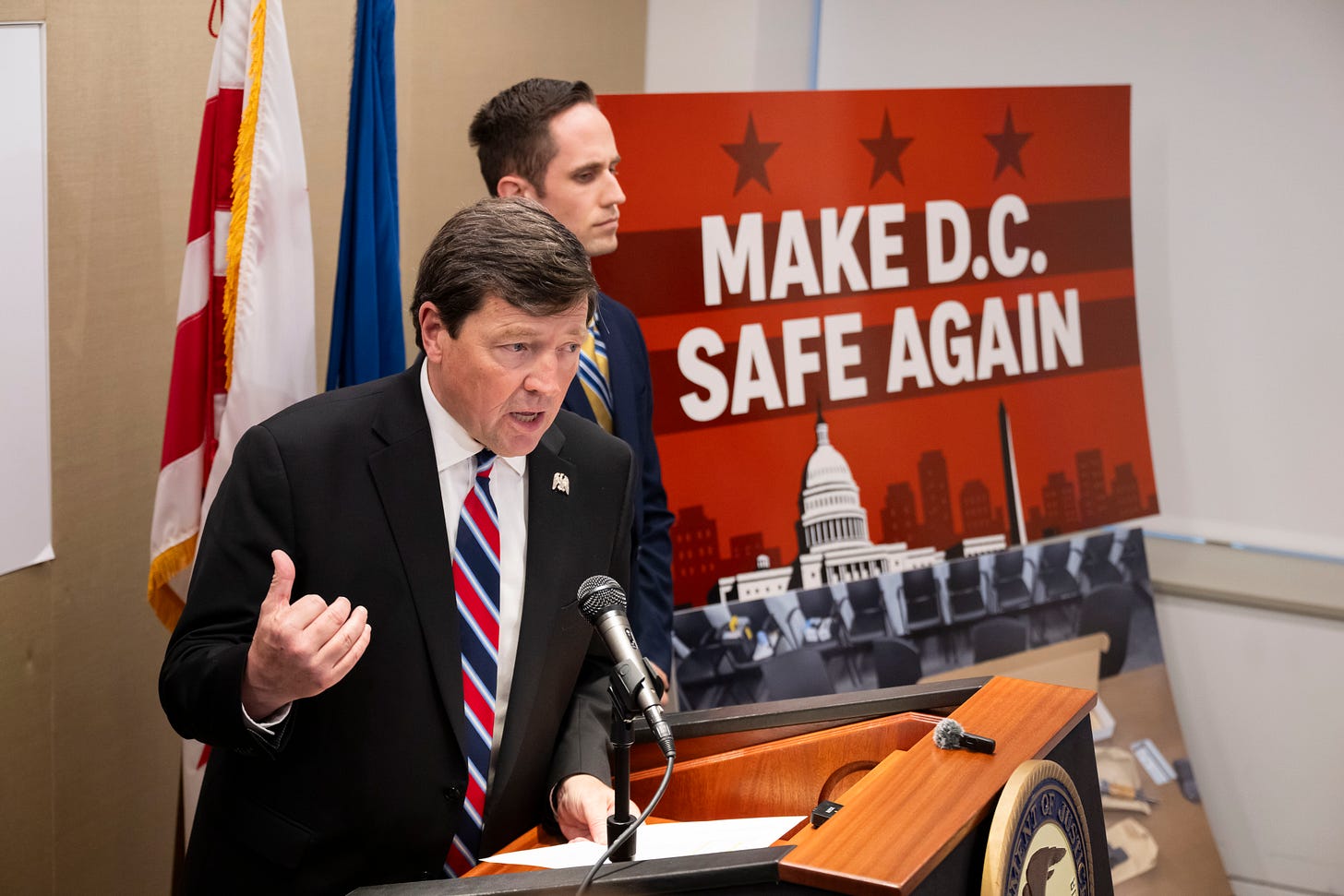Ed Martin's peculiar view of pardon power
Trump's pardon attorney is very confused about how pardons work.
PN is supported by paid subscribers. Become one ⬇️
Let’s get one thing straight: Ed Martin, President Donald Trump’s pardon attorney, is a buffoon.
In a normal administration, Martin wouldn’t have any job, much less the power to recommend to the literal President of the United States who deserves to have the consequences of their criminal conviction set aside or be protected from future prosecution.
But in this administration, regrettably, Martin makes perfect sense. He’s a two-bit political operative with extremely limited legal experience and a complete lack of ethics.
This isn’t a story about Ed Martin as such, though, as Martin is really just a very useful tool for Trump to reward cronies, donors, and his most loyal stormtroopers.
But what if some of those true believers cannot receive the gift of Trump’s mercy because they were prosecuted in a state rather than federally? Enter Ed! Since Martin neither knows what he’s doing or cares whether it’s legal, he’s perfectly willing to float the most unconstitutional trial balloons, such as “Trump could just pardon people for state crimes if he wants to” and “former President Biden’s pardons can be reversed.”
Let’s unpack that state crimes one, shall we?
Presidents cannot pardon people for state crimes, nor protect them from being charged by a state for future crimes. Period. There’s no wiggle room here. Don’t believe it? OK, well, let’s mosey on over to the DOJ’s Office of the Pardon Attorney’s FAQ page:
Does the President have authority to grant clemency for a state conviction?
No. The President’s clemency power is conferred by Article II, Section 2, Clause 1 of the Constitution of the United States, which provides: “The President … shall have Power to grant Reprieves and Pardons for Offenses against the United States, except in Cases of Impeachment.” The President’s authority to grant clemency is limited to federal offenses and offenses prosecuted by the United States Attorney for the District of Columbia in the name of the United States in the DC Superior Court. An offense that violates a state law is not an offense against the United States. A person who wishes to seek a pardon or a commutation of sentence for a state offense should contact the authorities of the state in which the conviction occurred. Such state authorities are typically the governor or a state board of pardons and/or paroles, if the state government has created such a board.
We can probably rest assured that Martin didn’t write this, doesn’t know it’s there, and that if anyone finds it, the administration will simply solve any problems that arise by deleting it from the website. That’s their favorite trick for making problematic things disappear, an unsurprising tactic for an administration stuffed with people who lack object permanence. Yes, if we can no longer see it on your website, surely it no longer exists or has the force of law!
This is how toddlers think, tucked under a blanket, thinking that if they can’t see you, you can’t see them.
That pesky little FAQ, you’ll see, quotes the part of the Constitution that completely trashes any notion the president could pardon state crimes: “[H]e shall have Power to grant Reprieves and Pardons for Offences against the United States, except in Cases of Impeachment.”
The problem here is that some of Trump’s biggest true believers got jammed up in state court, and neither Trump nor Martin can stand the fact that Trump can’t reach down and erase those convictions.
Nonetheless, Trump did some showy pardons of dozens of election deniers earlier this month, though none of the people on that list have any federal charges pending, and any statute of limitations on their 2020 efforts may have already expired. However, fake electors still face state criminal charges in Michigan, Nevada, Wisconsin, and Arizona.
Trump also fake-pardoned his 18 codefendants in the Georgia election interference case, a mish-mash of fake electors, local GOP officials, and Trumpland attorneys.
This is not how it works
One would think that the pardon attorney would strive to explain to the president the limits of his pardon power. Instead, Martin is over on X, gushing about Trump pardoning “the 2020 Alternative Electors” and thanking Trump for allowing him to work with Attorney General Pam Bondi, Deputy Attorney General Todd Blanche, and Solicitor General John Sauer “to achieve your intent — let their healing begin.”
Who knows how much Bondi, Blanche, and Sauer buy this, but either three of the highest-ranking attorneys in the federal government believe the president can pardon people for state crimes, or they do not believe any such thing but want to indulge Trump. We’re not sure which is worse, honestly.
Martin, however, is definitely in the former camp, as evinced by the deep thoughts he shared with Steve Bannon:
“One, there’s a broad argument that the pardon can apply to state charges. I leave to others for fighting it out, but there is in the history of the country, of course, you go back in time, at the very beginning, the charges a pardon operated against any crime against the United States, at the period early on, you’re pardoning local charges too.”
Ah yes, the well-known “history of the country” and “you go back in time” legal doctrine. You can see why Martin wants to let other people figure it out.
In Martin’s messy little mind, he likely thinks he’s making some grand point that in the early days of the Republic, the country was so small-ish that the president just mucked around and pardoned whoever he wanted, wherever he wanted. But someone really needs to tell him about the basics of federalism and how the Founding Fathers were very much into the diffusion of power, states’ rights, and that the Constitution enumerates federal powers while leaving the rest to the states.
In short, the idea that George Washington or John Adams or Thomas Jefferson or James Madison were reaching down into the states and interfering with their process of criminal justice is absurd.
But if you don’t buy Martin’s “local charges” theory of the pardon power, he offered another idea to Bannon:
“But I’ll just say this, if you charge somebody for forgery or obstruction of justice and the underlying crime ... the government says wasn’t a crime, you take the wind out of the sails of the argument. What are you doing? And what becomes clear and should be clear is that they’re doing this for politics.”
It’s hard to figure out what Martin is trying to get at here. Is it that if Trump simply declares something was not a crime, that erases a state’s ability to prosecute someone for it? Or does he think that if Trump pardons someone, then the person no longer committed a crime, so a state can’t prosecute them?
Let’s take a moment to reflect on the fact that Ed Martin is an actual lawyer. Not a good lawyer, mind you, but at least someone who has received some sort of rudimentary training in the profession. Surely even Ed understands that the only way “the government says wasn’t a crime” is by a criminal law being invalidated by a court or a legislature amending or repealing the law. Trump does not get to just decide that something isn’t a crime.
“If the feds say we want something, you change your tune”
Much to their eternal chagrin, neither Trump nor Martin can figure out a way to shake Tina Peters loose from the clutches of the state of Colorado.
Peters is the former Mesa County clerk who was sentenced to nine years in prison after giving another conspiracy-addled Trump fan access to the county’s election system as part of her attempt to prove voter fraud had denied Trump victory in 2020.
Trump has been pushing the DOJ to “secure the release” of Peters for months and has now taken to threatening Colorado if it does not free her, because she is an “innocent political prisoner.” Also being floated? That Peters be moved to federal prison, even though she was convicted in state court, so that she can have protection as a witness in a federal probe over voter fraud in the 2020 election.
Martin, for his part, indicated to Bannon that he thinks it’s just dandy for the administration to threaten the state over this: “Todd Blanche is the guy leading on this. We did it in a way that puts the right kind of pressure on them. If you’re Colorado … if the feds say we want something, you change your tune.”
It really is just unimaginable to Martin that there is any sphere where Trump can’t get what he wants. If it requires getting rid of federalism, if it requires getting rid of the Constitution, so be it. Trump should have no checks on him, ever.
It’s clear that people like Martin really want Trump to be a king, to declare what the law is and isn’t, to prosecute or dispense mercy as he wishes, with no one who can tell him no. So it’s perfectly fitting that Martin has the power to recommend mercy when wearing his Pardon Attorney hat and the power to target people for politically-motivated sham prosecutions when he dons his Director of the Weaponization Working Group hat.
In that role, Martin targeted New York Attorney General Letitia James, pushing for criminal charges, sending her an unhinged letter demanding she resign, and stalking her outside her Brooklyn home.
Perhaps Martin donned both his hats when he decided to “investigate” former President Biden’s pardons. It’s laughable to see Martin feign concern that Biden was not competent and therefore there were “abuses of the pardon and commutation process by political actors in the Biden Administration.” And also the AutoPen, of course.
Martin sent a comically pompous email to GOP Rep. James Comer about this:
As the Pardon Attorney, I can tell you unequivocally that my Office cannot support the validity and ongoing legal effect of pardons and commutations issued during the Biden Administration without further examination.
Their validity must be fully examined in light of what we now know - and I suspect ultimately by a Court with a presentation of the evidence you and others have gathered.
Martin might want to tread carefully with his “bad actors manipulating a no-longer-competent president” theory, as Trump recently insisted he had no idea who Changpeng Zhao was, even though he’d just granted him a pardon.
And as far as the whole “I, the pardon attorney, cannot support Biden’s pardons” bit? Nobody needs you to, buddy. Pardons are unreviewable. But it’s emblematic of Martin’s approach that he simultaneously believes that Trump’s pardon power should not even be bound by the Constitution, but Biden’s pardon power should be nonexistent. In that way, and so many more, he’s perfect for Trump.
That’s it for today
We’ll be back with a special Saturday edition tomorrow. If you appreciate today’s PN, please do your part to keep us free by signing up for a paid subscription.
Thanks for reading, and for your support.







Ed Martin isn’t just a buffoon, he’s the perfect symbol of how this administration weaponizes incompetence.
The pardon power was meant to temper justice with mercy, but under Trump it’s been twisted into a tool of retribution and loyalty tests. Martin’s willingness to float blatantly unconstitutional ideas (pardons for state crimes, reversing prior pardons) shows the contempt for law and the embrace of raw power.
I’ve been writing about this exact behavioral farce: when justice is no longer about fairness or repair, but about rewarding cronies and punishing enemies, you don’t get mercy, you get corruption dressed up as authority. That’s the real story here.
I am sick and tired of people thinking just because they utter the words, they are automatically true. Trump can’t effing read… He has NEVER read the U.S. Constitution. If he did, he didn’t understand a fricking word of it… Jeezus, people… Great post! Thanks, Lisa!